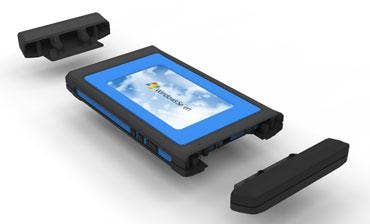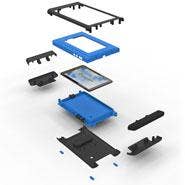Turn Any Tablet Into A Custom Appliance

For every company employing field workers, there's a workforce that might be more productive carrying a computing device. Yet purpose-built solutions from Motorola, Panasonic and others are often square-peg devices for the round hole of each company's applications and workflow. That's where Mobelisk fits in. The company this week released MoGo Chimera, the latest version of its ruggedized enclosure for off-the-shelf tablets that can be outfitted with needed peripherals and remain unburdened by those that are not.
With its unique system of electro-mechanical controls, the Mobelisk solution acts as a kind of abstraction layer, converting the hardware and operating system of choice into a durable, custom computing appliance that's resistant to shock, dust and even liquids. Current models support Apple iPad Mini, Google Nexus 7, and Samsung's 7-inch Galaxy Tab 2 and 8-inch Galaxy Note 8. Snap-on peripherals will include readers for magnetic cards, smartcards, barcodes, contactless devices, fingerprints and RFID, and for printing and boosting power and I/O. There also will be blank end caps for applications that require fewer than two peripherals.
Mobelisk started out developing its own ruggedized, purpose-built tablets for healthcare, retail and other verticals. "A seven-inch version was sold as Verizon's 'Blank Slate' device," said CEO Dennis Hamann. "That one had a mag-stripe card reader built in." But Hamann soon realized that competing in the market for specialized appliances required more than just having the perfect app. "We used to think that if you didn't have the latest hardware or software, it was OK because the app made the difference. But that wasn't true." Devices using older operating system versions of slower processors were at a marked disadvantage. "If you don't have the latest specs, you're [negatively] compared to competitors."
By focusing his company's intellectual property on the enclosure and what he referred to as the "transposer layer," Hamann has removed his company from the tablet wars. "We're no longer competing with Samsung and Apple; now we're complementary. Let those companies innovate and battle it out on the tech specs. We'll stay agnostic and support the resulting devices." Citing unspecified research, Hamann said that of the 7.8 million tablets purchased in the U.S. each year, 8 percent are destined for ruggedized-use markets, a number he said is estimated to reach 10 percent by 2016. Mobelisk has its main pillars in healthcare, retail, hospitality and financial services.
NEXT: Differentiating MoGo From Motorola's ET1

Hamann said that a key differentiator of the Mobelisk solution is that its abstraction layer is programmable. "This gives programs the ability to access physical key presses and do a hard reset," he said. APIs will be available when the solution is released later this year. Also, unlike competitors, the modular design of MoGo Chimera can be configured to carry only those peripherals that are required by the application. It also includes end-cap validation to ensure that mag-stripe readers and other security-prone devices are genuine and working properly, and are not being spoofed or hacked. MoGo's peripheral options "all came out of direct engagements with Verizon customers; they're exactly what people want," said Hamann.
The outer case, too, is designed for end-user branding, and can be ordered in custom colors, logos or even with overprinting. Hamann said that the plan is to certify MoGo Chimera at IP54, which provides ingress protection from enough dust or splashes of water to be harmful. "But we're hopeful for IP65," he said, which permits no incursion of dust and protects components from high-pressure sprays of water from any direction. "It's also rated for one meter of drop endurance," Hamann added.
Unlike many of today's made-in-China devices, Mobelisk's hardware is made right here in the good old U.S.A. "We're proud to say our stuff is manufactured and assembled in Phoenix." Hamann said that for purpose-built deployments, companies generally start with a small pilot program to shake out the bugs, and then roll out devices in phases. "People will order 10, then another 150, and then perhaps 1,500 over a year-and-a-half. For these lot sizes, economies of scale from mass production doesn't make sense. Flexibility is key for us. We're not doing volume, so it doesn't make sense to go overseas."
MoGo Chimera evaluation units are expected to be available in July; general availability is set for September.
PUBLISHED ON MAY 22, 2013